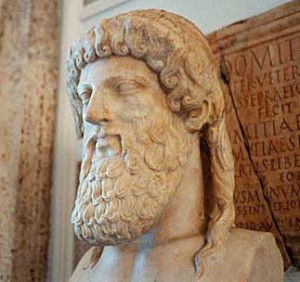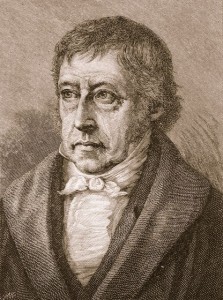Idealists believe that the external, material world is produced by the mind or ideas and that it cannot exist separately. Reality therefore begins inside the head, not out in the street.
Plato thought that everything in the material world owes its existence to a perfect, external, and unchanging idea from which it is modelled. He called these ideas “Forms”. Forms of abstract notions such as courage and justice serve as ideals for people to strive towards. Just as we imagine an ideal horse, perfect in every way, we can imagine the ideal of justice and strive towards achieving it.
Plato’s “dialogues”are usually about the nature of one Form or another. “The Symposium”(meaning “party with wine”) is a discussion between different people on the nature of love. One person suggests that love between two people is like a circle cut in two, each making the other whole again. One of the characters, named Socrates, argues that true love is not a physical thing. he says it is when people search together for the truth and what is good. Socrates is often the main character in Plato’s dialogues. It is usually safe to assume that whatever the character Socrates says is what Plato believed. “Platonic love” is a love that involves the mind and not the body.
In his dialogue “The Meno”, Plato examines the nature of knowledge. He argues that the mind , or soul, has passed through many existences, both in and out of bodies. Knowledge is about remembering this previous experience.
 The most famous of Plato’s ideal Forms is his ideas of an ideal society, which he wrote about in “The Republic”. In this book, Plato expresses strong views about the structure of society. He believed that there are different types of people. Some are not particularly bright and can never expect to hold important positions. He said these people have souls of bronze. These people grow up to be farmers and other workers. Plato labelled this class the “common people”. Above them are those with silver souls. These people possess some talents and have the ability to become quite important in society. They are best suited to police and protect the state. Plato called this class of people the “soldiers”. At the top of the ladder are those with souls of gold. these people have the intelligence and education needed to become philosophers and rulers. Plato called this ruling class the “guardians”.
The most famous of Plato’s ideal Forms is his ideas of an ideal society, which he wrote about in “The Republic”. In this book, Plato expresses strong views about the structure of society. He believed that there are different types of people. Some are not particularly bright and can never expect to hold important positions. He said these people have souls of bronze. These people grow up to be farmers and other workers. Plato labelled this class the “common people”. Above them are those with silver souls. These people possess some talents and have the ability to become quite important in society. They are best suited to police and protect the state. Plato called this class of people the “soldiers”. At the top of the ladder are those with souls of gold. these people have the intelligence and education needed to become philosophers and rulers. Plato called this ruling class the “guardians”.Plato argues that philosophers make the best leaders because they are wise and less likely to act irrationally. Plato believed that the state would remain stable and just with philosophers in power. His ideal society is an ordered class structure, where people remain fixed in their roles. People are trained to the limit of their ability, and that is their allotted place in life. It would be improper for a farmer to rule the state, or the philosopher to work the fields.
Plato thought women and men are equally capable of ruling. But he also thought that men tend to do things better. However, his view on the equality of women and men was revolutionary for the time.
Plato’s ideal state is a controlled society. The temptation to be greedy — one of society’s greatest ill — would be removed by abolishing private property. To prevent people making the state less important than their families, all the children would be taken away at birth, never to know their real parents. Children would be raised by the state and encouraged to think of everyone as their mother and father. The state rulers would also choose people’s marriage partners.
Many of Plato’s ideas on the perfect society have influenced politicians throughout history. “The Republic” is still read by many people.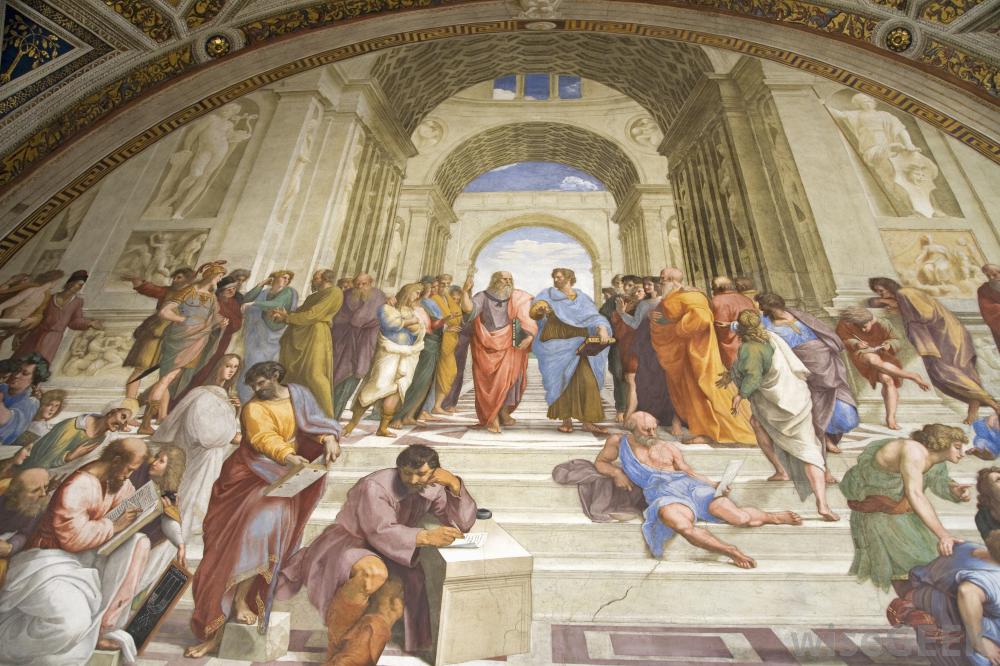

Hypatia was a Neo-Platonist, one of a number of philosophers living in the first few centuries AD who were strongly influenced by Plato’s ideas. She shared Plato’s belief that the material world is less real than the world of mind or spirit. Her idealism centred around a belief in a divine being, called “the One”. She made a clear distinction between body and soul, matter and spirit. A person’s soul is the only part that belongs to the world of spirit. It is like a small light in the dark, guiding a person towards true enlightenment, which can only be found in “the One”.
Berkeley denied the existence of material world altogether. He said it is all in the mind. Berkeley argued that all we can know for sure is that we perceive things in our minds and that we believe them to exist outside of us. He said, “to be is to be perceived”, meaning that things exist only by way of the mind’s awareness of them. His critics scoffed at this notion. It would mean that things disappear when no-one is looking. Berkeley, an Anglo-Irish bishop, had an answer for this. He said that God perceives all things and this is enough to guarantee their continued existence.
Hegel developed a massive philosophical system to explain reality. He maintained that the universe and anything in it is interconnected. He said that reality is the product of cosmic mind. It is an idea in motion. All of history can be explained by the development of that idea.Hegel said that history could not be understood unless each age is viewed as a small piece in a huge jigsaw puzzle. This is a radical view of history. the traditional view is that history is the result of changes in the material circumstances of people. For instance a new technology can change the way people communicate or fight wars. According to Hegel , these material changes in society are the effects of a deeper process of change. He argued that this deeper process is “an idea realizing itself”.
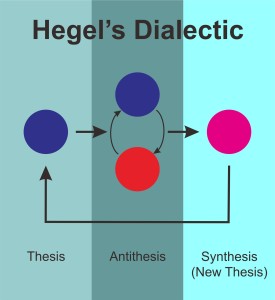 Hegel said that this cosmic idea develops by way of a fixed pattern, which he called the “dialectic”. This is a three-fold process. First of all an argument, or “thesis”, is put forward. Then an opposing argument , or “antithesis”, is introduced. After much struggle a compromise is reached, which is known as the “synthesis”. This compromise then becomes the new “thesis”, and the whole process starts again ad infinitum. In Hegel’ view, each great era of world history begins as the synthesis of opposite forces in the preceding era. These opposite forces (thesis and antithesis) eventually destroy the historical moment, but a new and better era rises from the ashes.
Hegel said that this cosmic idea develops by way of a fixed pattern, which he called the “dialectic”. This is a three-fold process. First of all an argument, or “thesis”, is put forward. Then an opposing argument , or “antithesis”, is introduced. After much struggle a compromise is reached, which is known as the “synthesis”. This compromise then becomes the new “thesis”, and the whole process starts again ad infinitum. In Hegel’ view, each great era of world history begins as the synthesis of opposite forces in the preceding era. These opposite forces (thesis and antithesis) eventually destroy the historical moment, but a new and better era rises from the ashes.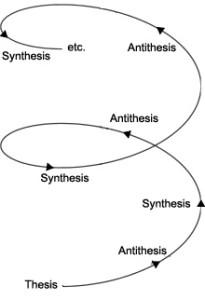 The “dialectic” is the motor by which Hegel’s system operates. He demonstrated that the dialectic process underpins all history, including the history of human thought. Hegel argued that in each successive age, people develop a better knowledge about the world. Today, Hegel’s proof of this development would be that modern science and technology give a more accurate picture of how the universe works than they did fifty years ago. In the future, the knowledge will have develop further.
The “dialectic” is the motor by which Hegel’s system operates. He demonstrated that the dialectic process underpins all history, including the history of human thought. Hegel argued that in each successive age, people develop a better knowledge about the world. Today, Hegel’s proof of this development would be that modern science and technology give a more accurate picture of how the universe works than they did fifty years ago. In the future, the knowledge will have develop further.For Hegel, history is progressing towards complete knowledge. The dialectic process will end in a final “synthesis” that reveals the mind of God.
